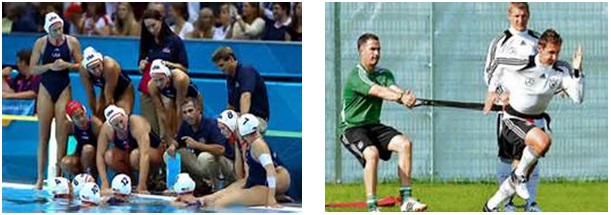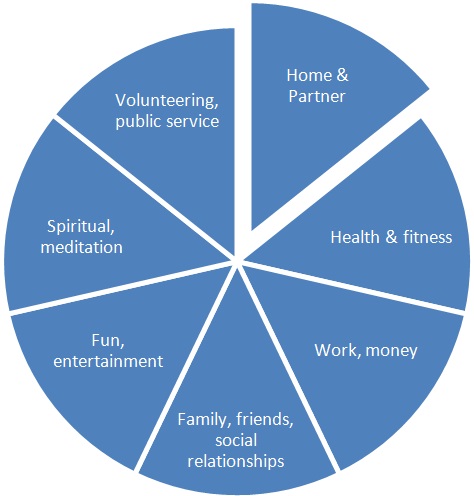A Coaching Model Created by Jennie Douglas
(Transformational Coach, UNITED STATES)
Message to My Clients
This first section is a description of how I see my coaching clients, with a description of my coaching model for them.

Like an elite athlete, you are intentionally focused on getting ready for your big performance, the next phase of your life.
You are multi-faceted, bringing a wealth of talents, values and wisdom to the arena of life. Your life supports your vision: you embody motion in balance, striving for smooth, flowing performance.
You could be facing questions like these:
- How do I improve my performance, and get the specific results I want?
- How do I avoid (or recover from) burnout, and maintain (or recapture) my passion in life?
- How can I get unstuck, and move forward?
- How do I develop my knowledge and skills so I can capitalize on my strengths?
- Who or what else do I need on my team?
You gather your team around you to help you prepare and succeed. Like an elite athlete, your coach is on your team. Coaching helps you get clearer about what you really want, how you’re going to get there.

By focusing on what you – as an individual or team – really want and what’s happening now, we start appreciating your stories that show you performing at your best, aware and optimistic. We work together to create a values-based vision, committing with crystal clarity. We get curious about your resources, expanding your plan for what you need to put in place and eliminating obstacles that stand in your way. Trusting yourself and your team, holding yourself accountable to your vision, you move forward towards the growth and results you’re looking for.
Explaining My Coaching Model: What It Means to Me as a Coach
The first section of this paper outlines how I can describe my coaching model to clients. In the rest of this paper, I will describe how my coaching model underpins how I see my clients and how I work with them. I have included my reasoning and some research in context, partly because I view this paper and model as mostly for my use as a developing coach. It captures where I am now, as a coach, and allows for organic growth in the future.
My coaching model starts with the metaphor of “client as athlete” for a number of reasons:
- Athletic pursuits require motion in balance. When all elements are optimized, we perform at our best with smooth, flowing performance. Motion is action, the work we put into making our dream (or goal or intention) come true.
- Athletics is like a microcosm of life. Everything that you need to do well at a sport is required for other pursuits in life.
…talented people are very good at reflection (good thinkers). They also exploit their strengths through strong self-awareness, which is turned into their advantage. In addition, talented people often fail, but learn to convert setbacks into opportunities. They have an urge for personal growth, meaning and purpose in all that they do, and a general feeling of being on the move (Robertson & Abbey, 2003).[1]
- Our end goals may be transformational and radical, such as when we take up a new sport or we want to break through to a completely new level. At other times, we may want an incremental improvement, such as creating a consistent tennis serve so that a beginner can start competing. Every option in that range of goals or intentions that we take to our coaches, as athletes, is equally important.
- Even though we like to give ourselves credit for accomplishments, we rarely do anything in life without social support. Even a “solo” sport such as golf, the successful athlete is never alone. The caddy carries our gear and clubs around the course. The coach is our partner in development and preparation. The team plays with us, challenges us in practice, provides support, and “has our back.” The medical and therapeutic professionals help keep us healthy.
- Sports coaching provides a rich history I can pull from to continue my learning and development to apply to coaching in other domains. I found an article in The Australian Psychologist, 2007, describing how sports coaching may apply to corporate coaching, a domain where I plan to coach:
Loehr and Schwartz (2001) have described executive leaders as “corporate athletes” and suggested that to perform at high levels over lengthy periods of time they must train in the same systematic, multi-level way athletes do.
Show Time: The Athlete’s End Goal
In athletics, the end goal is typically an event, competition, or performance. Let’s call it “show time.”
Show time can be the big event, as well as mini-events or incremental milestones that lead to the big goal. Preparation is crucial. Getting ready in a systematic way, taking care of all dimensions in life, helps the athlete optimize his or her performance. From targeted skills practice to mindfully developing resilience in the face of fear, preparation will take the most time and energy in the process. And for the true athlete, there is always the next event, so celebrate the moment, recover, and assess what was achieved. Then, the cycle starts again.
Applying this to the coaching conversation, we can consider these stages:
 “Athlete” as a Multi-Faceted Individual
“Athlete” as a Multi-Faceted Individual
When approaching a coach, the client brings a vibrant multi-faceted individual to the partnership. Even if the goal or intention seems physically oriented, like in sports, it’s a trap to focus only on physical considerations. As sports demonstrate time and time again, other factors such as emotions or interpersonal relations can triumph over physical skill.
As coach, it is my responsibility to approach my client holistically, considering every element in the client’s life as equally important.
MindTools.com includes the following elements in their standard Wheel of Life:
- Home & physical environment
- Partner, love, relationship
- Health & fitness
- Growth & learning
- Career, business, work
- Money/finance
- Family, friends, social relationships
- Community
- Fun, enjoyment
- Spirituality
Other elements may include:
- The roles the client plays
- What the client values in life
- Emotional health and intelligence
- Mental acuity, intelligence, cognitive skills
- Artistic expression or creativity: music, art, writing, crafts, hobbies
- Service or giving back to the community, philanthropy
By identifying and then considering the key dimensions of the client’s life, all coaching conversations can aim for creating motion in balance.
“Athlete” and Coach Collaborating in a Social Context
The coaching relationship is by nature a collaborative relationship in which neither participant takes a superior role . . . it creates an equal balance of power in the coaching relationship.[2]
What does a collaborative relationship with an equal balance of power look like?
Whatever your experience has been with sports coaches, my model’s view of this relationship is focused on the client first as the source of wisdom, commitment, and growth. The coach works at the same level with the client, collaborating toward the client’s end goal.
Equal partnerships are demonstrated symbolically in the following photographs. Look for the coach in the photo shown on the left; he is in the middle of the team, vertically and horizontally. In the photo on the right, the coach is an integral part of the targeted skills practice, shown in the green shirt.


